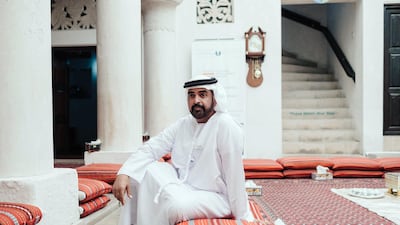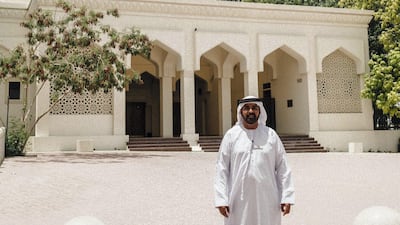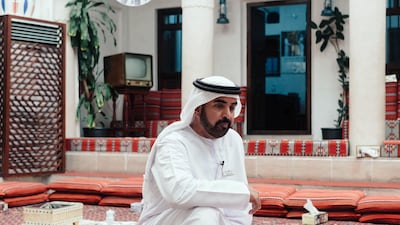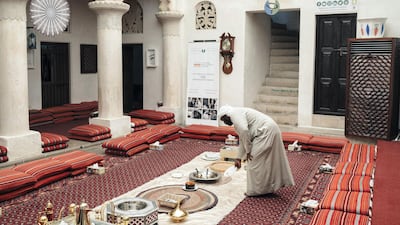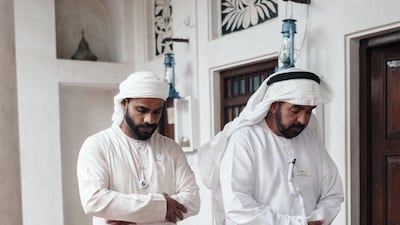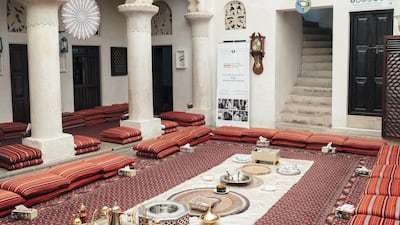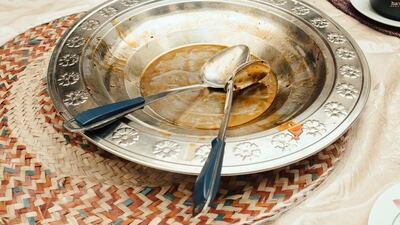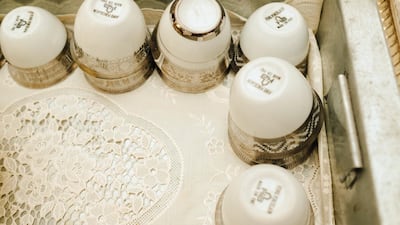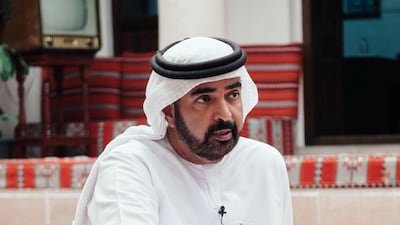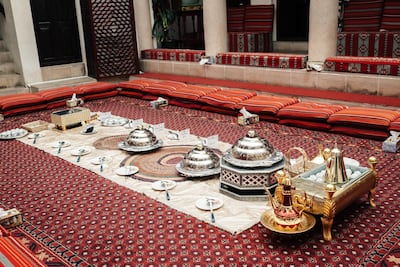Decades ago, during Ramadan, the steady sound of drumbeats would echo through village streets across the UAE. "Time for suhoor!" the mesaharaty – or Abu Tabla; the man with the drum – would shout. "Oh wake up you who sleep, and praise Allah!"
Ahmed Al Jafflah, 55, remembers the words clearly, even though he was only a few years old at the time. "He would sing a song. He would say: 'Wake up from your sleep, have your suhoor'."
The retired Emirati cabin crew manager has spent most of his life in the UAE, working for 29 years for Emirates before he became a protocol manager and senior presenter for the Sheikh Mohammed Centre for Cultural Understanding in Dubai. "I took early retirement and I thought I might enjoy myself, but then I got bored," he says, a British lilt punctuating his Khaleeji accent, the result of spending his university years in England, where he met his wife. "My friend was working at the centre and asked, 'why don't you come join us? I did, and I really enjoyed it."
His role as a presenter means he spends his days leading UAE residents and visitors through the streets of old Dubai or the Jumeirah Mosque, teaching them about the country's deep-rooted traditions. It doesn't take long before you realise how important culture is to Al Jafflah.
We meet him in the majlis of the SMCCU's Bur Dubai centre. The beautifully restored wind tower sits at the heart of the Al Fahidi Historical District, formerly known as Al Bastakiya, amid the labyrinthine alleyways and coral-clad heritage houses. Al Jafflah, who comes from a family of Bedouins, is wearing Emirati national dress and is perched, barefoot, on a low, traditionally decorated cushion, as he enthusiastically recounts his childhood, remembering those days when the "drum man" would roam the streets. "Kids would wake up even before the Abu Tabla came, and they would run behind him, banging things around, to support him," he says.
When Al Jafflah was a little older, his family moved from Al Shindagha to Al Jafiliya. "We had the mosque, which also announced when it was time for suhoor," he says. When he was a teenager, they moved to Jumeirah. "That's when we started putting an alarm on," he says with a laugh. This is the perfect example of how Ramadan traditions have shifted in the UAE, he says.
Ramadan in the '70s
In the 1970s, when Al Jafflah first began fasting, his family had an established routine for Ramadan: every morning, his mother woke him up, as well as his father and 16 siblings, about an hour before Imsak. "My mother was very busy; I would always see her carrying a baby in one hand, with two or three behind her and one in her stomach," he says, adding that his was a "small" family in comparison to their neighbours'.
"Mum would cook some nice food [for suhoor]. This might be white rice with yoghurt or laban, or bread, with some sauce, a bit of chicken and some cow's milk. We had a cow at home, so she would milk that cow. She'd have water and dates for us ... As soon as the call to prayer sounds, that's it, we stop eating and drinking, and all we take in is the oxygen."
He spent mornings at school with his friends, who were also fasting, before coming home to take an afternoon nap. Around 6pm, his family would break their fast. "As soon as we heard the call to prayer, we'd have a date and glass of milk maybe, or laban, then go to the mosque, pray, come back and eat," he explains.
"Mum would have cooked us a nice dish, mainly rice with meat and sauce or chicken, or even barbecued fish. We'd have white rice and ghee – the oil would be dropped into the rice and melt into it." Dessert would be simple: some fruit, or a few more dates.
His mother would always make extra food, too, and he and each of his brothers and one sister would take a plate to the neighbours, who would offer a dish of their own in return. "We'll have different dishes on the table – this is one of the customs of Ramadan."

Once the meal was over, Al Jafflah's father would visit friends and relatives around the neighbourhood, sitting with them in a majlis or a tent. He'd then participate in the longer evening Tarawih prayer, and return home at about midnight or 12.30am.
Ramadan in 2019
Today, Al Jafflah has a family of his own. He still lives in Jumeirah, but with his wife and their five children (four daughters and one son). "When we break fast at this time of year it'll be at about 7pm," he says. "I break the fast with my family. It's more fun because Dubai will come alive in the night."
Al Jafflah, like his father before him, will spend many of his evenings during Ramadan visiting friends. As he also owns a small herd of camels – seven dromedaries, six of which are pregnant – he'll head to Al Marmoom, where fellow camel-owners and Bedouin families live and hang out each evening. "There are about 150 houses, each with a tent set up in front of it," he explains.
He'll spend two or three nights a week moving from tent to tent, socialising, snacking and chatting. "We might sit and talk about life or about camels for about two hours before I go to another tent," he says. "There might also be older people talking about life in the past and their livestock, which I find very interesting. When we have camels, we want to learn how our ancestors took care of them, the kind of food they fed them, what they did when the camels got sick."
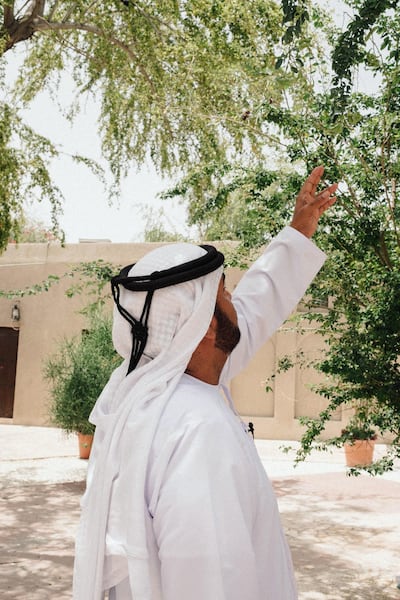
Al Jafflah spends his other nights at the SMCCU, leading private and public iftar gatherings, during which the centre's presenters will break their fast with about 150 visitors across two branches. Together, they'll feast on staple Emirati dishes and teach the visitors about age-old Ramadan traditions, taking them on a tour around the sikkas, or alleyways, of the historical district. They'll also visit the nearby Al Farooq Mosque, and then perform a prayer before hosting a Q&A session.
"Ramadan is important to us, as it only comes once a year," Al Jafflah says. "We do our level best to enjoy it and do the right things, because the [spiritual] rewards we get are double than normal days."
Times are changing
But he says things in the UAE are changing. Even though his village still adheres to many of the old ways of life, he sees many differences in the way Ramadan is celebrated today. For a start, he says, there's no "butbayla" any more. "The drummer man has started dying out in the UAE, which is a shame because he really made life in the village," he says.
The custom of visiting your neighbours is also becoming increasingly less common, he adds. "People used to visit each other and congratulate them on Ramadan, and have coffee. Ladies would go to each other's houses and talk about life and kids. This is dying little by little."
On the plus side, there is a greater choice of dishes available now, but at the same time, Al Jafflah laments the amount of food that goes to waste, particularly with the new practice of five-star hotels putting on vast buffet spreads for both iftar and suhoor. "It shouldn't be that much; we should put out what we eat," he says. "My mum would cook for about 20 people and give some to the neighbours. Nowadays you have six or seven types of dishes – meat, chicken, fish – and people don't really eat that much. It should not be wasted."
In his household, his family will pack up what they don't eat and take it to people who cannot afford a lavish dinner. Or, they'll eat the leftovers for suhoor.
"In Islam, there is haram and halal. Haram is something you should not do. Halal is something you should do. Waste is haram," he says. "When my grandfather died he was over 100 years old. He was healthy, still walking, I remember he had one tooth. They were walking all the time, eating less, not because they wanted to but because they had nothing else.
"His name was Said Al Jafflah and he was a Bedouin. They drank a lot of milk, ate dates – that was the main diet. He didn't eat an apple or a banana, he didn't know anything about that."
Al Jafflah says that today, we all need to remember to "buy what you want, but do not buy more than you need".
His family moved to the city when his father was only seven years old, so all Al Jafflah has known is his urban setting. But to this day, he still has family living in the desert near Al Marmoom. Each year, he'll make an effort to visit them. "Their Ramadan is more hospitable than ours; the whole family, the whole village, will have a plate of food," he says. "Some houses don't even cook because they have so much food. They visit each other, they visit the sick, older people and young people.
"That village still has a lot of the old customs.”

The city-dwelling Al Jafflah clan do what they can to keep these traditions alive, though. Most importantly, he works hard to maintain a sense of community. "My favourite part of Ramadan is when I sit with my family and break the fast," he says. "This time is a celebration for us, as we've gone the whole day without eating. It's very important when we sit with the whole family that each and every one of them tells you something about their day.
“They’ll tell you if they got thirsty that day, if they made a mistake and drank water without realising they’re fasting. They tell us about school, how their friends feel about Ramadan, and if they did anything special to do with Ramadan that day.”
We spend a couple of minutes talking about how his schooldays compared to that of his children, who are aged between 15 and 27. We also touch on the advancement of technology and Al Jafflah smiles as he admits he has to ask his children to repeat certain words, because they're all new to him. "It's another world," he says. "I must say, life was simpler in the past. But we try our level best not to forget."
